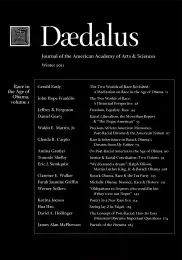“Obligations to Negroes who would be kin if they were not Negro”
The 1965/1966 Daedalus issues on “The Negro American” reveal how America’s racial future was imagined nearly a half-century ago, and at least one of the prophecies - voiced by sociologist Everett C. Hughes - found its fulfillment in an unexpected way at President Obama’s inauguration in 2009. Short stories by Amina Gautier (“Been Meaning to Say” and “Pan is Dead”), Heidi Durrow’s novel The Girl Who Fell from the Sky, plays by Thomas Bradshaw (Strom Thurmond Is Not a Racist and Cleansed), and poems by Terrance Hayes (“For Brothers and the Dragon” and “The Avocado”) suggest trends in recent works by African American authors who began their publishing careers in the twenty-first century.
At the present moment there is no one dominant note in Negro literary expression. As the Negro merges into the main stream of American life, there might result actually a disappearance of Negro literature as such. If that happens, it will mean that those conditions of life that formerly defined what was “Negro” have ceased to exist, and it implies that Negroes are Negroes because they are treated as Negroes.
[ . . . ]
If the expression of the American Negro should take a sharp turn toward strictly racial themes, then you will know by that token that we are suffering our old and ancient agonies at the hands of our white American neighbors. If, however, our expression broadens, assumes the common themes and burdens of literary expression which are the heritage of all men, then by that token you will know that a humane attitude prevails in America towards us. And a gain in humaneness in America is a gain in humaneness for us all. When that day comes, there will exist one more proof of the oneness of man, of the basic unity of human life on this earth.
–Richard Wright, “The Literature of the Negro in the United States” (1957)1
Richard Wright, who died in Paris in 1960, was not quoted or mentioned in the special issues of Dædalus on “The Negro American” in 1965 and 1966. However, many contributors to the issues shared Wright’s interest in confronting the conditions that have defined the lives of American Negroes and have caused them to suffer agonies at the hands of their white neighbors.2 Wright’s forward-looking comment, his imagining of a different and perhaps better future, anticipated a possible exhaustion of the African American narrative,3 and the Dædalus contributors likewise made cautious predictions for the future. Returning to those prophecies from several decades ago makes for a fascinating enterprise.
. . .
